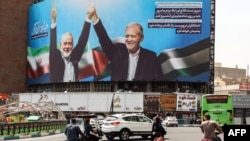Iran’s new president Masoud Pezeshkian was sworn into office July 30, at a time of mounting tensions over the conflicts between Israel and Iran’s proxies in the Middle East, including Hamas in Gaza and Hezbollah in Lebanon. Pezeshkian has praised the so-called “resistance front” fighting against Israel and said Iranian support for it was a religious obligation.
Later on Pezeshkian’s inauguration day, tensions rose even higher, when Ismail Haniyeh, a top Hamas leader who had attended the inauguration, was assassinated in Tehran. Just hours earlier, Fouad Shukr, a senior Hezbollah commander, was killed in Beirut by an Israeli missile strike.
The United States, which had no involvement in the attacks, has repeatedly underscored Israel’s right to defend itself. The U.S., however, is calling for renewed efforts to find a diplomatic solution to the conflicts - in the near term, by coming to agreement on the current ceasefire proposal for the conflict in Gaza.
In his swearing-in address, Iranian President Pezeshkian, in addition to expressing support for Palestinians, advocated for “normal relations with the world,” and deplored the economic sanctions which have been imposed on Iran by the United States and other countries. He vowed to work for their removal and called them oppressive and unjust.
State Department Principal Deputy Spokesperson Vedant Patel said the United States has a different view of injustice when it comes to Iran:
“What the United States thinks is unjust is the Iranian regime’s treatment of women and girls. ... What we think is unjust is the way ... we have seen the Iranian regime crackdown, time and time and time again, on just basic protests, basic people making their voices heard, expressing their opinion about actions that this Iranian regime [is] undertaking. Those are the true injustices that the Iranian people are facing. It is the ones that are inflicted by the Iranian regime itself on its own people.”
Spokesperson Patel said the United States is “going to judge the Iranian regime on the actions that it takes, not any empty words.” In the past, he noted, those actions have included violating its nuclear obligations; exporting terrorism; funding proxy groups; as well as disregarding “basic fundamentals of democracy, basic fundamentals of human rights.”
“If [Iran] is interested in being a member and party to the international world order,” said Spokesperson Patel, “it needs to begin by respecting and abiding by the international world order.”














